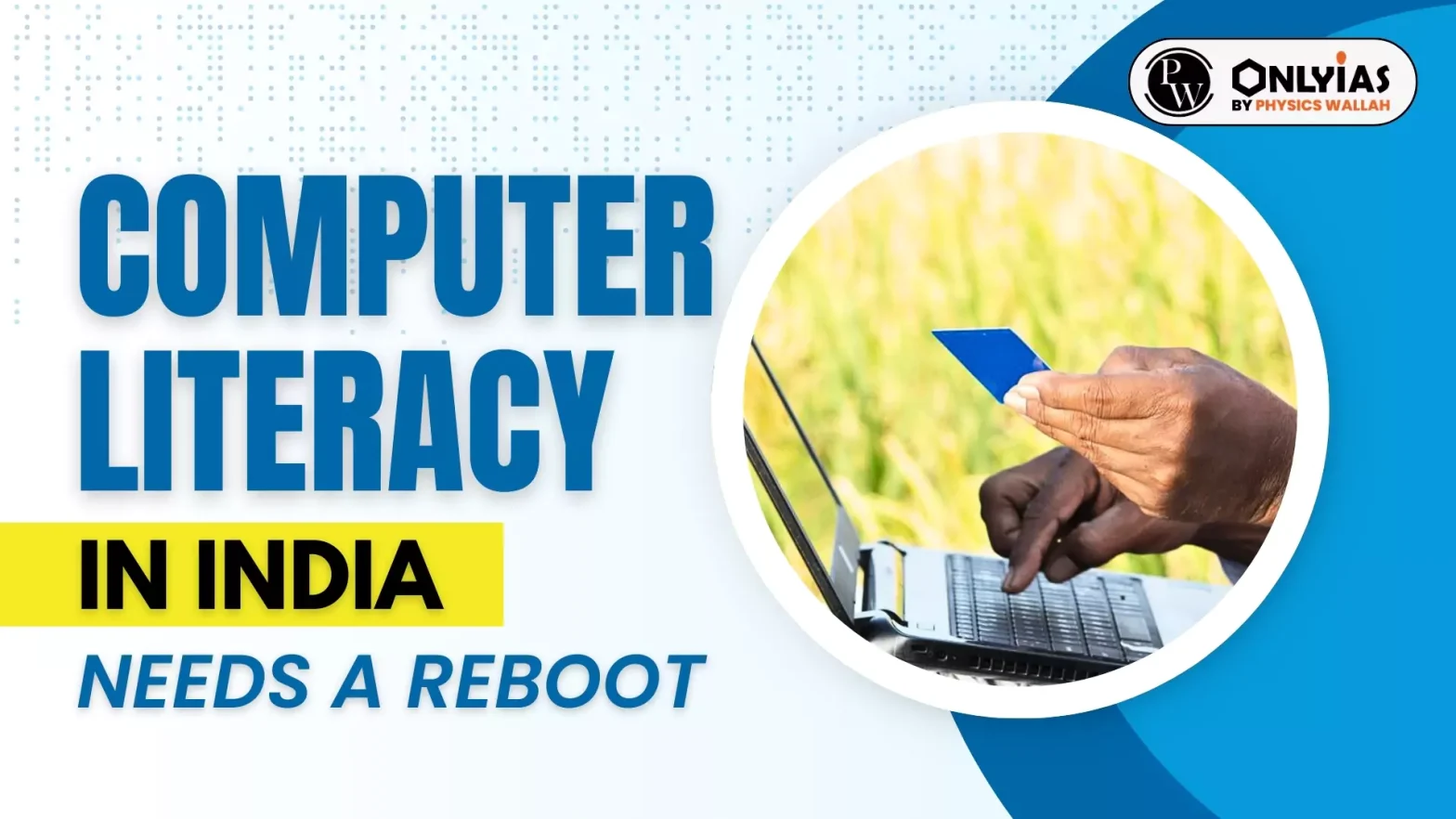As per the recently released NSS 78th round of the Multiple Indicator Survey (conducted in 2020-21), computer literacy stands at 24.7% among individuals aged 15 years and above.
| Relevancy for Prelims: Computer Literacy, NSS 78th round of the Multiple Indicator Survey (conducted in 2020-21), India’s Initiatives for Computer Literacy, etc.
Relevancy for Mains: Computer Literacy in India- Need, Challenges and Measures need to be taken, etc. |
About Computer Literacy
- Refers: Computer literacy implies the knowledge and the ability to use computers and technology efficiently.
- It ensures that individuals can access and use these services effectively, enhancing their quality of life.
- Importance: Computer literacy is essential in today’s world as critical services such as banking, health care and various government services have become digital.
- The COVID-19 pandemic highlighted the importance of computer and Internet access, from ordering groceries and online education to managing banking and health-care services.
- India’s Initiative: The Indian government launched the Digital India campaign in 2015 to transform the country into a digitally empowered society.
- Schools: Computer education is increasingly being integrated into the formal education system in schools from an early age.
- Various Centres: Additionally, numerous skill development and vocational training programmes are focusing on enhancing computer literacy among youth and adults, mainly targeting underprivileged and marginalised communities to bridge the digital divide.
- Concerning Data: The recently released NSS data is a cause for concern and cast a shadow over the nation’s digital aspirations.
- Overall Literacy: This marks an increase from 18.4% in 2017-18 to 24.7% in 2020-21.
- Rural Areas: It is an increase from 11.1% to 18.1%.
- In urban Areas: It is an increase from 34.7% to 39.6%.
- Rural India’s population, which is nearly 70%, will face significant disadvantages.
- A significant portion of the population will remain excluded from the government’s aim to provide various public services through digital technology.
Enroll now for UPSC Online Course
Need for Computer Literacy
- Employment: As Artificial Intelligence advances, employers seek individuals who are equipped with the capability to execute complex tasks. Hence, computer literacy can help employees develop skills that employers are looking for.
- Example: The Organisation for Economic Co-operation and Development’s The Programme for the International Assessment of Adult Competencies survey (2014-15) found that adults without computer experience are more often unemployed, with a 52.5% employment rate, compared to 72.7% for those with basic computer skills.
- A 2017 study, “Do Computer Skills Affect Worker Employment?, finds that computer skills enhance employability and worker productivity.
- To Counter Inequalities: Those with better computer skills can leverage technology for personal and professional development, while those lacking these skills face barriers, thus perpetuating economic disparities.
- Overall Development: Computer illiteracy in today’s digital society can leads to limited job prospects, social isolation, financial exclusion from online transactions and services, and restricted access to vast information resources.
- South Africa validated a positive correlation between computer literacy, employment probability, and earnings.
Challenges Associated with Digital Literacy in India
- Unequal Literacy across Age Groups: The proportion of computer-literate individuals varies across various age groups in India. As per the survey reveals, computer literacy diminishes with age, with higher rates observed among younger demographics.
- Cohort Effect: This trend, common in societal contexts, reflects the disparity in computer education accessibility between recent and older age cohorts, often referred to as a “cohort effect” or “generation effect” in social sciences.
- Unequal Literacy among States: Computer literacy rates among individuals aged 20-39 years across States shows a striking 55.1 percentage point gap between Kerala (72.7%), and Assam (17.6%).
- Economically disadvantaged States such as Assam (17.6%), Bihar (20.4%), Madhya Pradesh (21%), Jharkhand (21.2%), Uttar Pradesh (22.9%), Odisha (25.1%), Chhattisgarh (26%), and Rajasthan (27.6%) lag behind, with less than 30% proficiency in computer operation.
- As computer literacy is pivotal to social and economic development, the lower rates in economically backward States exacerbate their disadvantage in benefiting from modern development.
- A failure to address this divide will widen the development gap across Indian States.
- Lack of Infrastructure and Quality Teachers: Many schools and colleges across India lack the necessary infrastructure and qualified teachers to impart adequate computer training.
- This shortfall contributes to significant deficiencies in computer literacy among young students and new graduates, which could constrain their employment opportunities.
- Gaps in Access: Although computer education is a part of the school curriculum, there are significant gaps in access and instructional standards.
- Resistant to Learn: Among older age groups, computer illiteracy could be attributed to a lack of motivation to learn or due to limited access to learning resources.
- It is a common observation that older demographics tend to exhibit less enthusiasm in embracing new technologies.
Way Forward
- Enhancement of Learning at School Level: Schools should equip students with computer skills that will allow them to fully participate in our rapidly changing economies.
- School education should ensure that all graduating students possess computer literacy skills, as this is crucial to bridge the digital divide.
- Adequate Allocation of Resources: The government should allocate resources towards the training of computer personnel and ensure sufficient staffing levels.
- Targeted Programs for Older Population: For the older population outside the formal education system, targeted programmes are essential.
- These should involve various institutions, including local governing bodies such as panchayats and non-governmental organisations, to effectively reach and empower older individuals with computer literacy skills.
- Monitoring & Evaluation: The government should also conduct a thorough review of such computer literacy and develop strategies to achieve higher literacy and reduce disparities in the coming years.
Check Out UPSC NCERT Textbooks From PW Store
Conclusion
While India has made some progress in computer literacy, the outreach and outcomes of this mission remain limited. Bridging the digital divide and fostering inclusive growth necessitates sustained efforts by government, private sector, and civil society stakeholders.
![]() 5 Jul 2024
5 Jul 2024
